#akbar
Text
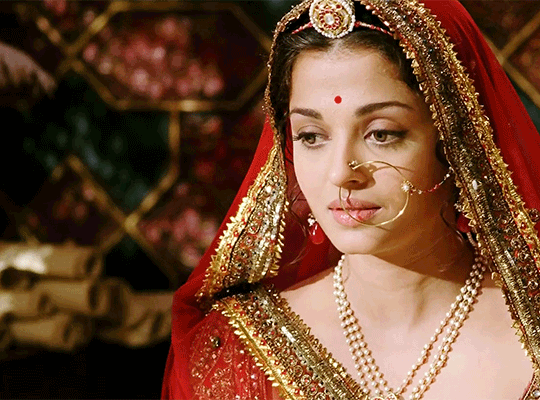
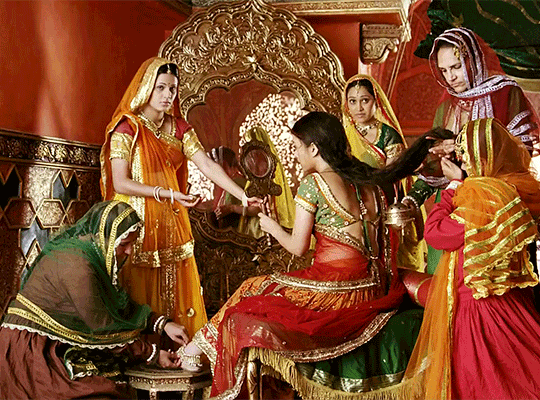
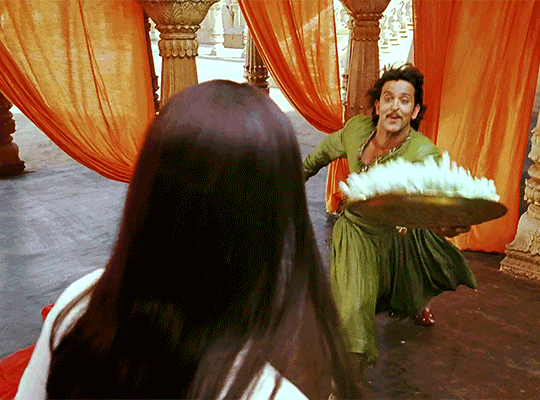
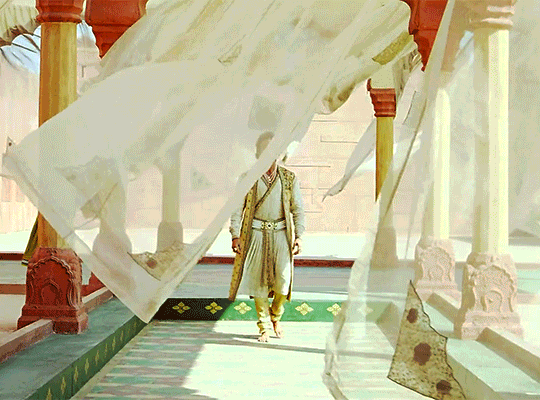
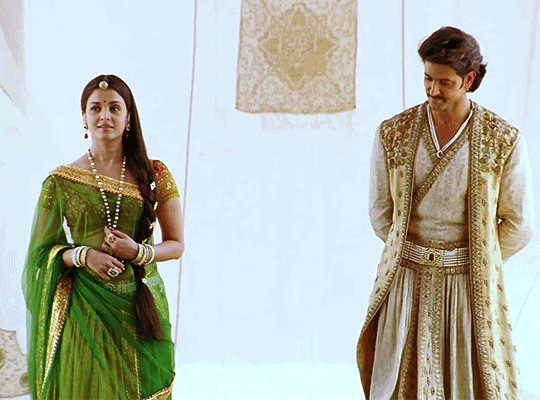
my fav trashy romcom, jodha akbar (2008) <3
#cringe dialogue + beautiful aesthetics#i can make so many more gifs from this movie omg#aish is too pretty#indian cinema#this movie literally runs on soldiers behead him!! level corny dialogue and insane chemistry bw aish and hrithik#indian tumblr#mughals#jodha akbar#period cinema#bollywood#bollyflix#cinemapix#cinemasource#cinematv#film stills#moviegifs#aishwarya rai#hrithik roshan#jodhaa akbar#akbar#filmgifs
33 notes
·
View notes
Text

Basawan and Suraj Gujrati. Illustration from Baburnama or Memoirs of Babur, ca. 183-1530.
Baburnama is an autobiographical account by Zahiruddin Muhammad Babur, a descendant of Timur and the first Mughal king of India. The miniatures are from an illustrated copy of the Baburnama prepared for the author's grandson, the Mughal Emperor Akbar. Akbar’s commissions were divided up among teams of artists working at the court, and often two painters collaborated on a single image, in addition to the calligraphers. This particular illustration is attributed to Basawan, responsible for the composition and the drawing, and Suraj Gujarati, who painted it. The miniatures reflect the culture of the Mughal court at Delhi, and are important as evidence of the tradition of exquisite miniature painting which developed at the court of Timur and his successors. Timurid miniatures are among the greatest artistic achievements of the Islamic world in the fifteenth and sixteenth centuries.
#ots#art#babur#baburnama#basawan#suraj gujrati#akbar#mughal art#mughals#medieval art#indian art#miniatures#illustration#mughal empire#indian history
54 notes
·
View notes
Text






18 notes
·
View notes
Text
'Kya parvardigar-e-alaam se aapne mujhe isiliye manga tha ke zindagi mujhe mile aur uske maalik aap hon? Saansein meri hon aur dil ki dhadkanon par aapka kabzaa rahe? Zille elahi, kya meri zindagi aapki duaon ka karza hai jo mujhe apne aansoon se ada karna padega?'
salim, mughal-e-azam
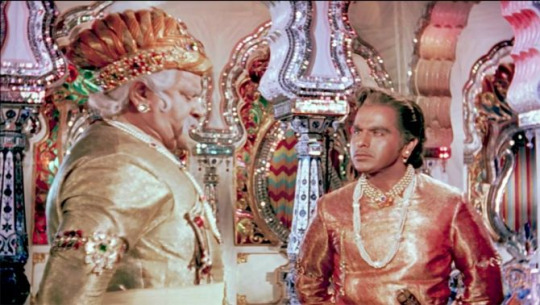
#desiblr#desi aesthetic#desi shit posting#desi stuff#bollywood songs#old bollywood#bollywood#mughal-e-azam#salim#akbar#movies#bollywood movies#old movies
10 notes
·
View notes
Text
The Tragic Love Story of Aurangzeb & Hirabai Zainabadi Mahal

Aurangzeb's portraits may depict an austere man reading the Quran, but there once lurked in him a passionate young man who had considered the "world well lost" for the love of his life.
This story is not an average Valentine’s Day tale. It is about a love affair of a different kind, of a prince known today only as strong-willed, calculating and devoid of a loving bone in his body. It is about Aurangzeb falling in love at first sight.
In 1636, Aurangzeb was a prince and the Governor of Deccan. En route to Aurangabad, he stopped at Burhanpur to pay his respects to his maternal aunt, who was married to Saif Khan, the Governor of Burhanpur. What followed varies in detail in different tellings. But all of them agree that the austere prince fell in love at first sight with one of the women in his uncle’s harem. Her name was Hirabai.
Ma’asir al-Umara, written by Nawab Shams ud Daula Shah Nawaz Khan and his son Abdul Hai Khan, in the 18th century provides a detailed description of the episode:
“One day the prince went with the ladies of his harem to the garden of Zainabad Burhanpur, named Ahu-khanah [Deer Park], and began to stroll with his chosen beloved ones. Zainabadi, whose musical skill ravished the senses, and who was unique in blandishments, having come in the train of Khan-i-Zaman’s wife (the prince’s maternal aunt), on seeing a fruit-laden mango tree, in mirth and amorous play advanced, leaped up and plucked a fruit, without paying due respect to the prince’s presence. This move of hers robbed the prince of his senses and self-control.”
Despite his extremely religious bent, Aurangzeb was a connoisseur of music and a proficient Veena player. Hirabai’s looks, combined with her musical accomplishments, proved irresistible for the prince. He is said to have been so infatuated with her that he gave in to her demand that he taste wine. But before he could, Hirabai revealed that she was just testing his love for her.
A religious prince ready to taste wine, that shows the extent of his feelings for her.
Akbar, in his bid to regulate the harem, had ordered that all concubines should be named after the place they belonged to. So once Hirabai entered Aurangzeb’s harem she was called Zainabadi.
Grieving in solitude
In Ahkam e Aurangzeb, written in 1640, Aurangzeb’s biographer Hamiduddin Khan Nimchah recounts the Burhanpur encounter differently. According to him, the meeting took place when the prince entered the harem unannounced. He fell into a swoon and, on being asked by his aunt, described the reason for the malady and asked for a remedy. He was given Hirabai in exchange for one of his concubines.
The ensuing passion and infatuation is described the same way in Nimchah’s account.
It is said in Ma’asir al-Umara that Aurangzeb’s love affair proceeded to such lengths as to reach Shah Jahan’s ears. Dara Shikoh, who had no love lost for his brother Aurangzeb, is said to have remarked to their father Shah Jahan, “See the piety and abstinence of this hypocritical knave! He has gone to the dogs for the sake of a wench of his aunt’s household.”
But as destiny would have it, Hirabai did not live for long. Her death affected the prince greatly. She is buried in Aurangabad.
Ma’asir al-Umara records that Aurangzeb was so upset by the death of his beloved that he left the palace to go on a hunt. When reproved by the poet Mir Askari (Aqil Khan) for risking his life in that agitated state, the prince replied:
“‘Lamentation in the house cannot relieve the heart,
In solitude alone you can cry to your heart’s content.”
Aqil Khan then recited this couplet of his own composition:
“How easy did love appear, but alas how hard it is!
How hard was separation, but what repose it gave to the beloved!”
The prince could not check his tears. He committed the verses to memory after vainly trying to learn the modest poet’s name.
Incomplete portraiture
Niccolao Manucci, the Italian traveller and writer (1639–1717), too describes this period in Aurangzeb’s life:
“Aurangzeb grew very fond of one of the dancing-women in his harem, and through the great love he bore to her he neglected for some time his prayers and his austerities, filling up his days with music and dances; and going even farther, he enlivened himself with wine, which he drank at the instance of the said dancing-girl. The dancer died, and Aurangzeb made a vow never to drink wine again nor to listen to music. In after-days he was accustomed to say that God had been very gracious to him by putting an end to that dancing-girl’s life, by reason of whom he had committed so many iniquities, and had run the risk of never reigning through being occupied in vicious practices.”
Source: https://scroll.in/article/706290/how-the-heartless-emperor-aurangzeb-fell-in-love-at-first-sight
Picture: Mughal paintings
#desi aesthetic#desi tag#desiblr#desi#desi culture#desi dark academia#desi stuff#desi academia#desi romance#mughal#mughals#akbar#aurangzeb#hirabai zainabadi mahal#zainabadi mahal#tragedy#love story#indian story#indian aesthetic#mughal empire#mohabbat#urdu shayari#shayari#quotes#story#urdu literature
28 notes
·
View notes
Text
This is only for emperors, if you are going for Someone Else they have to have been an emperor at some point. So no Dara Shukoh or any of the queens. I might make a different poll for the queens if this takes off.
Don't vote on the basis of politics - they were all objectively bad people and this is a fun poll. Vote for who you think is the most blorbo and/or who you think you can fix etc.
#mughal empire#mughals#mughal history#india#indian history#history#history polls#south asia#south asian#desiblr#desi tumblr#desi academia#polls#babur#akbar#shah jahan#auranzeb#delhi
8 notes
·
View notes
Text
The abandoned city of Fatehpur Sikri in India was built as a safe haven and garden city for the Mughal Empire. Today its stunning red sandstone architecture serves as a testament to their legacy.
27 notes
·
View notes
Text
I can't keep quiet anymore. I just see similar vibes here.

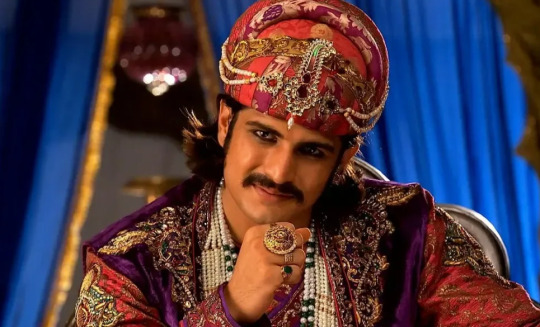
A ruthless and invincible ruler with a mad spark in eyes...
#[ I think it's all the royal headdress hairstyle and look#I don't even think anyone knows the second show here#Even if it's just me I still needed to say it. ]#lmao#aegon ii targaryen#hotd#Jodhaa Akbar#Akbar#my post
3 notes
·
View notes
Text

I love women.
Bibi Mubarika was one of the few remaining wives of the founder of the Mughal Empire in India, Babur. This excerpt is from the book 'Daughters of the Sun' by Ira Mukhoty. In this very specific paragraph, it recounts the time when Humayun, son of Babur and second Emperor of the Mughal Empire, was first defeated by Sher Shah Suri. After facing a horrible defeat at the hands of the Afghan leader, Humayun fled along with his haraman and remaining troops.
Bibi Mubarika was part of the haraman that was travelling with Humayun. But she decided to stay back in Agra when the others had decided to go other ways. Her courage saved her husband's grave from defilement at the hands of the enemy.
She lived through Humayun's reign and died early when her grandson and Humayun's son, Akbar became Emperor.
#history#historical#mughal#babur#akbar#humayun#india#indian#indian history#mughal empire#bibi Mubarika#women from the haraman#ira mukhoty#daughters of the sun#non fiction#books#book blog#booklr#bookblr#bibliophile
6 notes
·
View notes
Text

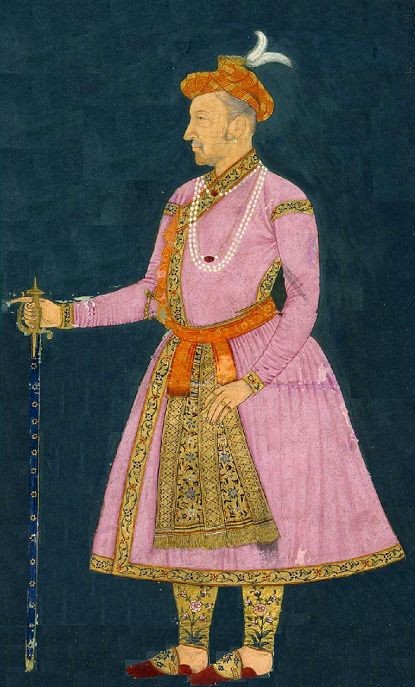
often the Mughal Emperors are shown with a ethnic look of Aryans/Central Asians but this depiction has many loop holes.
Mughals were claimed to have roots from Persian Mughals of Turkic-Mongol region. Even they have been risen from Timurid Dynasty hailing from Central Asia.
They had a more of Mongolian face cut.
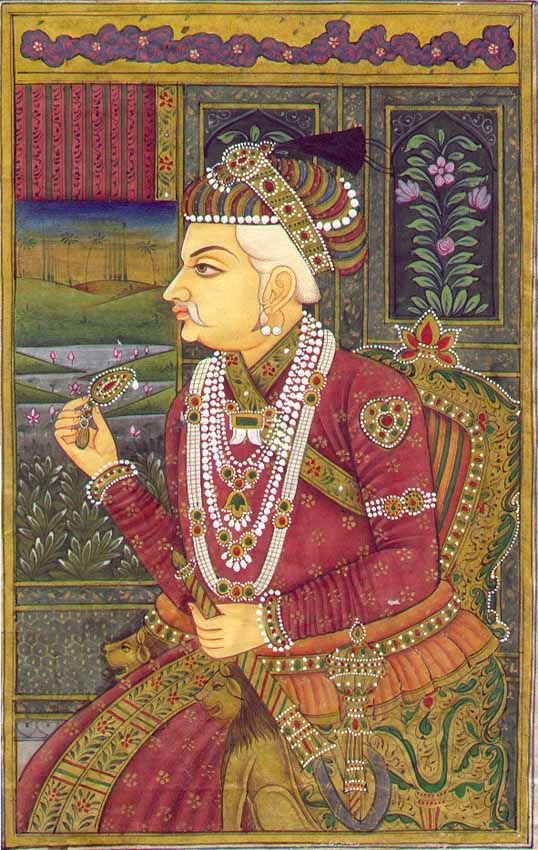
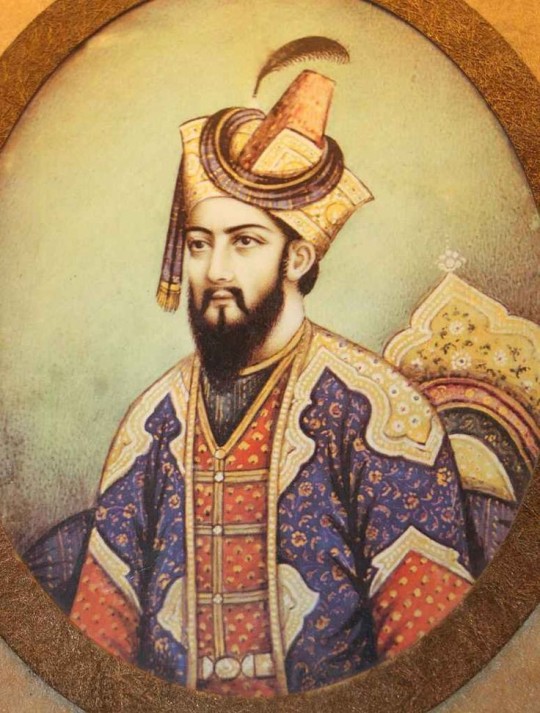
13 notes
·
View notes
Text

5 notes
·
View notes
Note
Favorite historical figure?
I'm super late on this, but it's so, so hard to choose only one. Like picking a favorite kid.
One historical figure that I've been kind of obsessed with lately, though, is Birbal. He was one of the navaratnas (nine jewels) of the court of Akbar, the third of the Mughal Emperor, and acted as an advisor and military commander. He was among the first officers to become a part of Akbar's court, and was noted for his generosity, learning (he was an especially good poet), and tactical skill, to the extent that he could sway the emperor's mind on nearly anything.
Birbal and Akbar were almost unusually close (apparently they were never parted after their first meeting until death), and there have actually arisen, since the 1500s, a genre of moral tales called Akbar-Birbal stories, (largely) fictional stories about him using his wit and intelligence to openly question the emperor and humiliate his rivals, often with witty quips and jokes to soften the blow. He also appears as a character in one of Salman Rushdie's best novels, his semi-fictional The Empress of Florence.
But there are a lot of really interesting and even quite touching factual stories involving the bond between Akbar and Birbal. According to Ira Mukhoty's biography of Akbar:
"During an elephant fight organized in the grounds of Akbar’s court, one of the elephants, ‘unique for violence’, suddenly rushed towards Birbal, and seized him with his trunk. Akbar turned his horse around and galloped towards the elephant, charging at him, while all around him his soldiers and courtiers shouted out in alarm. The elephant then turned towards Akbar but, inexplicably, faltered, and Birbal was saved."
In fact, when he built the city of Fatehpur Sikri, Akbar "ordered ‘the erection of a stone palace for [Birbal].'" For the thirty years he served Akbar, he was never once censured by the emperor, which is incredibly uncommon, as even some of the highest ranking courtiers found themselves punished more than once for relatively minor mistakes. Apart from Akbar, Birbal also cultivated very strong bonds with two of the other navaratnas, the poet Faizi and the musician Tansen, as well as the historian-advisor Abu’l-Fazl.
In 1585, Birbal left the court of Akbar for the first time, to personally lead a fight against the Pashtun Yusufzais in Kabul, where he was ultimately killed, along with thousands of Mughal troops.
Akbar was completely inconsolable, and his remaining friends and family at court had to fight to keep him afloat.
"For two days and two nights he refused any food or water, did not attend to any state matters, left the bemused ambassador of Turan unattended, and turned away in grief from the jharoka window. Akbar ‘grieved him exceedingly, and his heart turned away from everything’, wrote Abu’l Fazl. Hamida Banu, who had come to the Punjab to meet with her son, had to entreat with the Padshah, along with his attendants, to resume his activities. The entire court mourned Birbal and the poet Keshavdas wrote verses in Brajbhasha in memory of him."
An enemy of Birbal's at court, the theologian Baduni, wrote in his diary of the emperor that, "He never experienced such grief at the death of any Amir." Akbar became haunted by the idea of Birbal's body being left unprotected and without a proper burial in the rocky mountains of Kabul.
"‘By this heart-rending mishap, the memory of the pleasures of his lofty company has become very bitter,’ Akbar admitted to Abu’l Fazl, ‘and this sudden calamity has greatly afflicted my heart…some obstacles have prevented me from seeing the body with my own eyes so that I might testify my love and affection for him.’"
For months, and even years, after Birbal's death, rumors would filter into court that he had been spotted actually alive through the empire. Every single time one reached him, Akbar would send men out to search for his lost friend, taken with the hope that Birbal would finally return to him.
In 1586, Akbar left Fatehpur Sikri, never to return. He spent the rest of his life on the move, heading further and further north, closer to where Birbal had perished.
A small poem, thought by historians to have been written by Akbar in the depths of his grief, still remains.
"He saw the poor and gave them all
But never distributed sorrows.
Now that he has given even sorrow to me,
Birbal has nothing left for himself."
#sorry for the long answer#ask response#charliesmydarling#akbar#birbal#mughal#history#not the stones#ask game
16 notes
·
View notes
Text
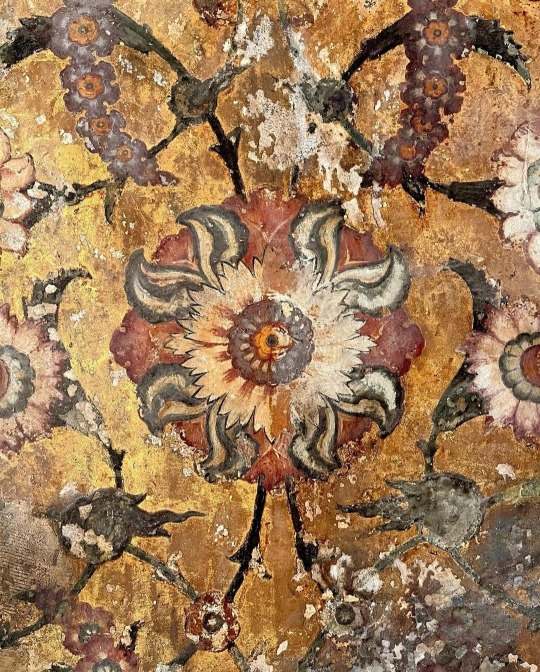

Details of the paintings inside Akbar's tomb, located just outside of Agra, built by Akbar's son Jahangir in 1605-1613.
Via Jordan Quill
106 notes
·
View notes
Text
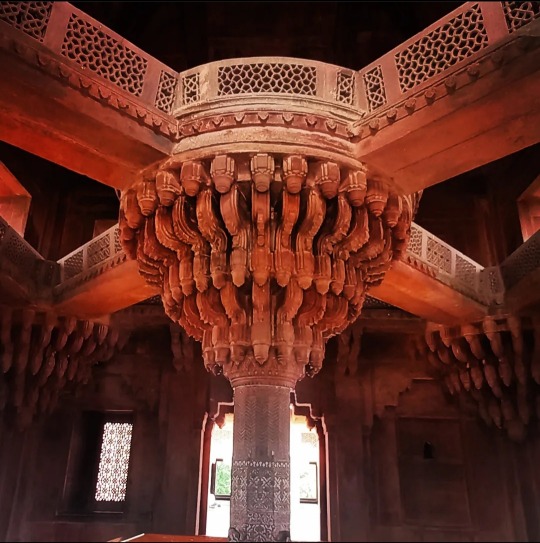
Fatehpur Sikri
This pillar is the Amalgamation of Hindu, Muslim and Christian architecture.Emperor Akbar used to sit here
Tagging: @bishh-kanya @kaurava-apologist @iams99 @mooonboy @swayamev @ramayantika @lazydreamer19 @gaydar-malfucktion @voidsteffy@dead-n-dusted
(Tell me if you want to be added or removed)
#desiblr#mobilography#art#desi culture#dark academia#dark academia aesthetic#mughal architecture#mughal art#mughal#fatehpur sikri#indian architecture#architecture#akbar#travel#travel photography
25 notes
·
View notes
Text
Jodha Bai Palace - Fatehpur Sikri




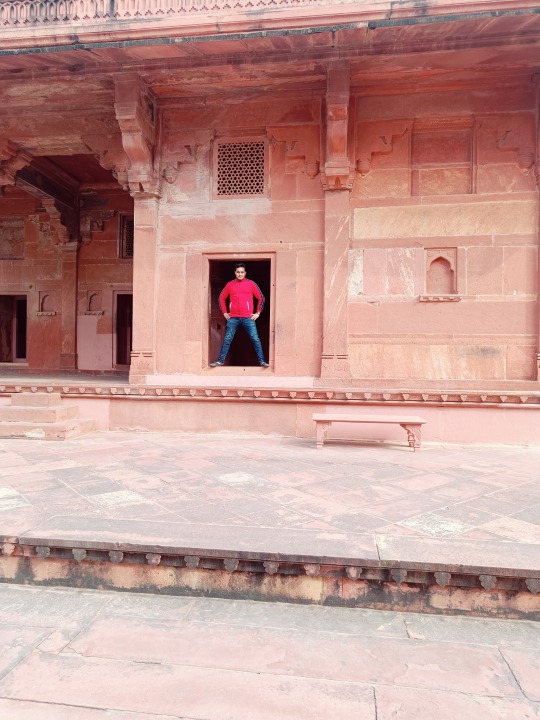
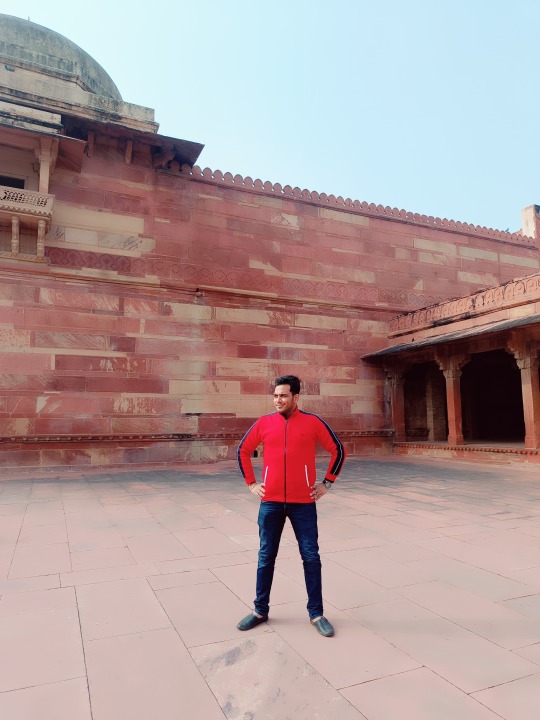
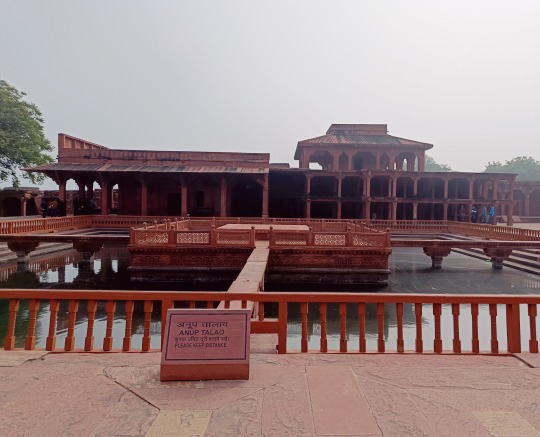
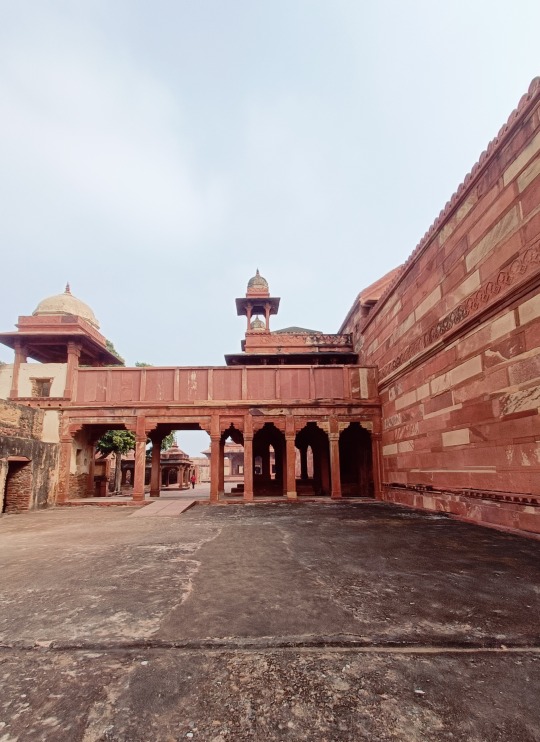


Jodha Bai Mahal' also known as 'Jodh Bai Mahal' is the largest palace in Fatehpur Sikri commissioned by Mughal Emperor Akbar in 1569 for his favourite queen consort, Mariam-uz-Zamani, commonly known as 'Jodha bai' . This Mahal is the largest complex of the zenana (palace for women belonging to the royal household ). It is a masterpiece of the fusion of Hindu and Persian architecture made with red sandstone...
.
.
.
..
..
#abhinavsr #specs #face #photooftheday #photography #hair #happy #smile #lenskart #likesforlike #blue #love #eyes #fashion #instagram #beautiful #song
#.#incredibleindia#travel#uttarpradesh#tourism#abhinavsr#photooftheday#photography#trending#red#love#fatehpursikri#akbar#jodhabai#king#queen#emperor#mughal#palace#handsome#Abhinavsr in red#Abhinav Srivastava#Abhinavsr style#Abhinavsr handsome
2 notes
·
View notes
Photo

study of Akbar (4356 Sunset Blvd, Los Angeles, CA 90029)
3 notes
·
View notes